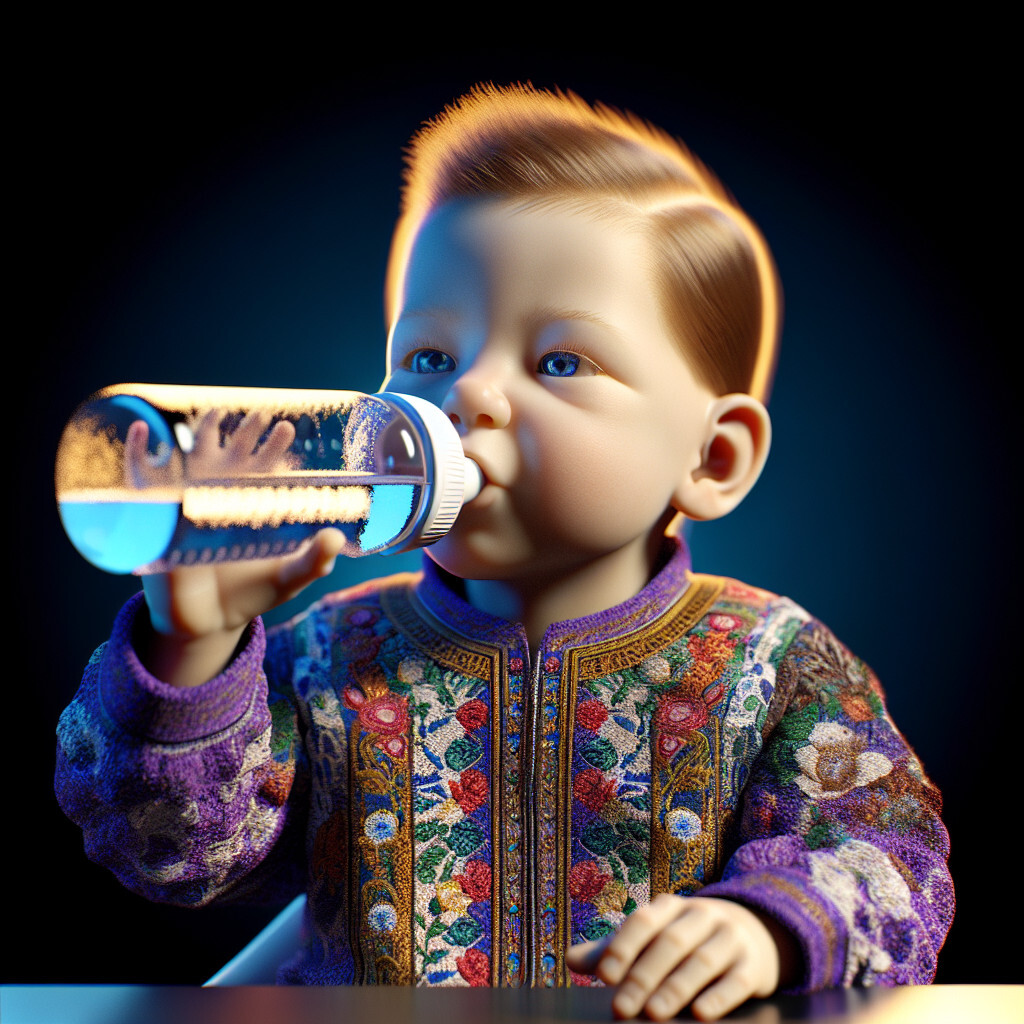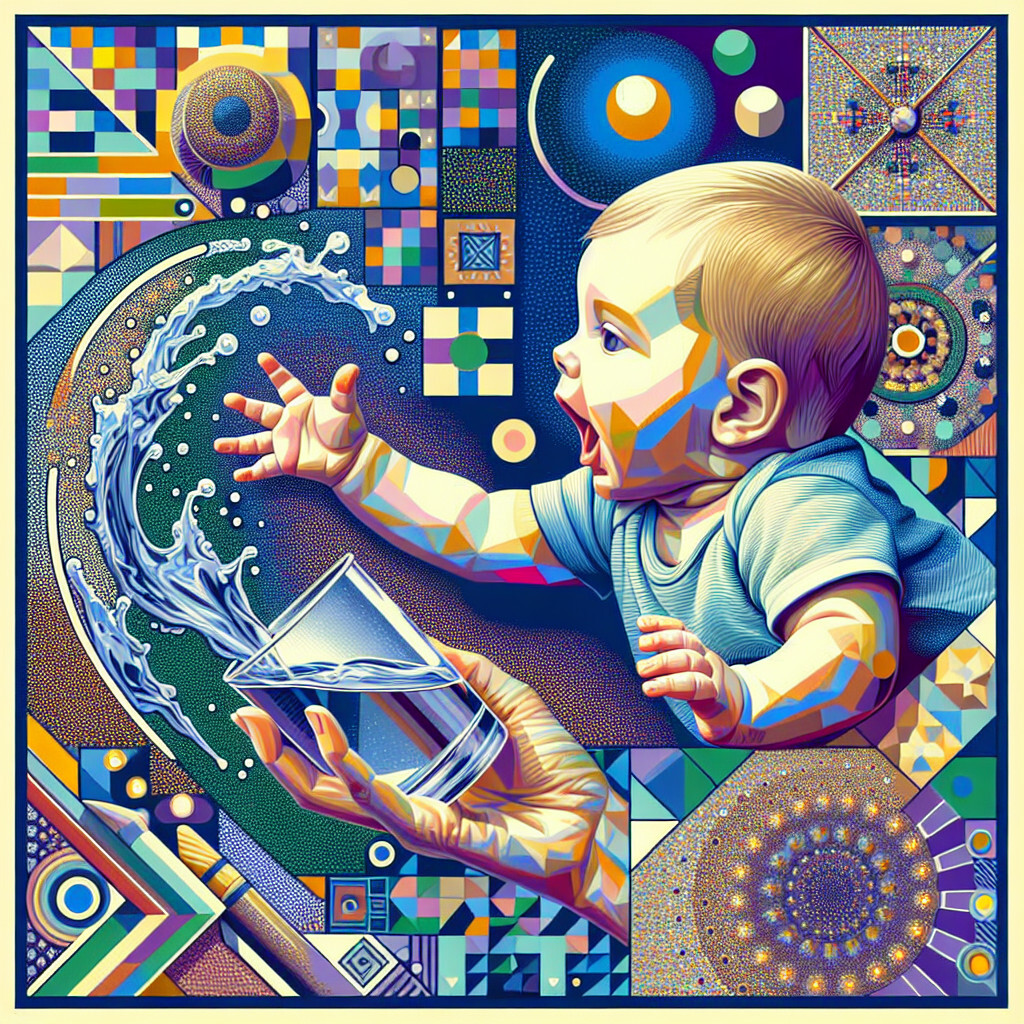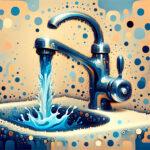-
Table of Contents
“Hydrating Tiny Tummies: The Importance of Water for Your 8-Month-Old”
Introduction

Introducing water to an 8-month-old baby is a significant milestone in their dietary development. At this age, babies are typically ready to start consuming small amounts of water in addition to breast milk or formula. This is not only a new taste experience for them, but it also aids in digestion and hydration. However, it’s important to note that water should not replace breast milk or formula as the primary source of nutrition at this stage. The introduction should be gradual and monitored to ensure the baby is accepting and tolerating it well.
Introducing Your 8-Month-Old to Drinking Water: A Comprehensive Guide
Introducing your 8-month-old to drinking water is a significant milestone in their growth and development. It’s a transition that requires careful planning and execution to ensure the health and well-being of your child. This comprehensive guide will provide you with the necessary information to make this transition as smooth as possible.
At around six months of age, babies start to need more than just breast milk or formula for their nutritional needs. This is the time when they begin to explore solid foods, and concurrently, it becomes appropriate to introduce them to drinking water. However, it’s important to note that water should not replace breast milk or formula, which are still their primary sources of nutrition.
By the time your baby reaches eight months, they should be comfortable with consuming small amounts of water. The key is to introduce it gradually. Start with a few sips during meal times, gradually increasing the amount as they get used to it. This slow introduction will help your baby adjust to the new taste and texture of water, making the transition easier for both of you.
It’s crucial to remember that while water is essential for hydration, too much of it can be harmful to your baby. This is because their kidneys are still developing and cannot handle a large amount of water. Therefore, it’s recommended that an 8-month-old baby should consume no more than 2-4 ounces of water per day.
When introducing water, it’s also important to consider the type of water you’re giving your baby. Tap water can sometimes contain high levels of minerals, so it’s often recommended to use boiled and cooled tap water or bottled water specifically designed for infants. However, it’s always best to consult with your pediatrician before making any changes to your baby’s diet.
The method of giving water to your baby is another aspect to consider. At eight months, your baby is likely developing the skills to hold a cup. Therefore, introducing a sippy cup or a straw cup can be a good idea. This not only helps them learn to drink water but also aids in their motor skill development.
It’s also worth noting that the introduction of water can help with teething. Many babies start teething around this age, and cold water can provide some relief to their sore gums. You can chill the water slightly or even provide it in a teething toy for them to gnaw on.
In conclusion, introducing your 8-month-old to drinking water is a delicate process that requires careful planning. It’s important to start slowly, monitor the amount of water they consume, and ensure the water is safe for them to drink. Additionally, using a sippy cup or a straw cup can aid in their development and make the transition smoother. Always remember to consult with your pediatrician before making any changes to your baby’s diet. With these guidelines in mind, you can ensure that your baby’s introduction to water is a healthy and positive experience.
The Importance of Hydration for Your 8-Month-Old: A Closer Look
The importance of hydration for your 8-month-old cannot be overstated. As parents, we are often concerned about the nutritional needs of our children, but we must not overlook the critical role that water plays in their overall health and development. At this tender age, your baby is growing rapidly and their body is undergoing significant changes, making hydration an essential aspect of their daily routine.
At around six months, babies start to consume solid foods, which gradually reduces their intake of breast milk or formula. This transition necessitates the introduction of water into their diet. However, the question that often arises is, how much water should an 8-month-old drink? The answer is not as straightforward as one might think, as it depends on several factors including the baby’s size, activity level, and the climate in which they live.
Generally, it is recommended that an 8-month-old should consume approximately 2 to 4 ounces of water per day. This is in addition to the breast milk or formula they are already receiving. It’s important to note that water should not replace breast milk or formula, as these are still the primary sources of nutrition for your baby. Water should be introduced gradually, starting with a few sips during meals and slowly increasing the amount as your baby gets used to it.
While it’s crucial to ensure your baby is adequately hydrated, it’s equally important to avoid overhydration. Giving your baby too much water can lead to water intoxication, a serious condition that can disrupt the balance of electrolytes in their body and potentially lead to seizures. Therefore, it’s essential to strike a balance and provide just the right amount of water for your baby.
The quality of water given to your baby is another important consideration. Tap water can sometimes contain harmful contaminants, so it’s advisable to use filtered or boiled water. If you choose to boil the water, make sure it has cooled down to a safe temperature before giving it to your baby.
Introducing a sippy cup at this stage can also be beneficial. It not only helps your baby learn to drink from a cup, but it also allows them to control the amount of water they consume. This can be a fun and engaging way for your baby to explore new textures and tastes, while also promoting their motor skills.
In conclusion, hydration plays a vital role in the health and development of your 8-month-old. While breast milk or formula should still be the primary source of nutrition, introducing water at this stage can help meet their hydration needs. However, it’s important to monitor the amount of water your baby consumes to avoid overhydration. Using filtered or boiled water and introducing a sippy cup can also be beneficial. As always, if you have any concerns about your baby’s hydration or nutrition, it’s best to consult with a healthcare professional.
How Much Water Should an 8-Month-Old Drink: A Detailed Analysis
As parents, we are often concerned about the health and well-being of our children, especially when it comes to their nutrition and hydration. One question that frequently arises is, “How much water should an 8-month-old drink?” This article aims to provide a detailed analysis of this topic, offering insights based on scientific research and expert recommendations.
The introduction of water into an infant’s diet is a significant milestone that typically occurs around the six-month mark, coinciding with the introduction of solid foods. However, it’s important to note that the primary source of hydration and nutrition for infants should still be breast milk or formula. Water should be introduced gradually and should not replace breast milk or formula feeds.
At eight months, an infant’s kidneys are still developing and are not yet capable of processing large amounts of water. Therefore, excessive water consumption can lead to a condition known as water intoxication, which can be potentially life-threatening. This condition occurs when an excess of water dilutes the electrolytes in the body, leading to seizures, coma, or even death in severe cases.
Given these considerations, pediatricians generally recommend that an 8-month-old should consume no more than 2 to 4 ounces of water per day. This amount should be offered in small sips from a sippy cup during meals. It’s also important to remember that the water given to infants should be safe and free from contaminants. Boiling tap water before offering it to your baby is a good practice to ensure its safety.
However, the exact amount of water an 8-month-old should drink can vary depending on several factors. These include the climate in which the baby lives, the baby’s overall health, and the amount of physical activity the baby engages in. For instance, in hot and humid climates, babies may require slightly more water to stay hydrated. Similarly, if a baby is unwell, particularly with conditions that cause fever, vomiting, or diarrhea, increased fluid intake may be necessary.
In addition to water, fruits and vegetables that have high water content can also contribute to an infant’s hydration. Foods like cucumbers, watermelon, and oranges can be introduced at this age and can provide both nutrition and hydration.
In conclusion, while water is essential for an 8-month-old’s diet, it should be introduced carefully and in moderation. The primary source of nutrition and hydration should still be breast milk or formula. Parents should consult with a pediatrician to determine the appropriate amount of water for their individual child, taking into consideration factors such as climate, health, and activity level. By doing so, parents can ensure that their child stays adequately hydrated while avoiding the risks associated with excessive water consumption.
The Role of Drinking Water in the Development of 8-Month-Old Babies
The role of drinking water in the development of 8-month-old babies is a topic of great importance to parents and caregivers. As babies grow and develop, their nutritional needs change, and understanding these changes can help ensure they receive the best possible care. One of the most significant changes that occur around the age of 8 months is the introduction of drinking water into the baby’s diet.
Until the age of six months, a baby’s primary source of hydration and nutrition is breast milk or formula. These provide all the necessary nutrients and hydration a baby needs for healthy growth and development. However, as babies begin to consume solid foods around the age of six months, their need for additional hydration increases. This is where the introduction of drinking water plays a pivotal role.
At around eight months, babies are typically eating a variety of solid foods, which are naturally lower in water content than breast milk or formula. Therefore, to prevent dehydration, it becomes necessary to supplement their diet with water. However, it’s important to note that water should not replace breast milk or formula, but rather complement it. Breast milk or formula should still make up the majority of a baby’s fluid intake, as they continue to provide essential nutrients that water does not.
Introducing water to an 8-month-old also serves another crucial purpose: it aids in digestion. As babies start eating solid foods, their digestive systems need to adapt to processing these new substances. Drinking water can help facilitate this process, making it easier for babies to digest solid foods and absorb their nutrients. Moreover, it can help prevent constipation, a common issue among babies transitioning to solid foods.
In addition to hydration and digestion, drinking water can also play a role in oral health. Even before the first tooth appears, water can help cleanse the baby’s mouth and gums, reducing the risk of oral health issues. As teeth begin to emerge, water can help rinse away food particles and sugars that could potentially lead to tooth decay.
While the benefits of drinking water for 8-month-old babies are clear, it’s important to remember that moderation is key. Too much water can lead to water intoxication, a serious condition that can occur if a baby drinks a large amount of water and doesn’t get enough nutrients from breast milk or formula. Therefore, it’s recommended that an 8-month-old baby should consume no more than 2-4 ounces of water per day, in addition to their regular feedings.
In conclusion, the introduction of drinking water into an 8-month-old baby’s diet plays a significant role in their development. It aids in hydration, digestion, and oral health, while also preparing them for a lifelong habit of healthy water consumption. However, it’s crucial to balance water intake with continued breast milk or formula feedings to ensure the baby receives all necessary nutrients. As always, if parents or caregivers have any concerns about their baby’s hydration or nutrition, they should consult with a pediatrician or a registered dietitian.
Q&A
1. Question: How much water should an 8-month-old baby drink?
Answer: At 8 months old, a baby should drink between 2-4 ounces of water per day, in addition to breast milk or formula.
2. Question: Can an 8-month-old baby drink tap water?
Answer: Yes, an 8-month-old baby can drink tap water as long as it’s been boiled first to kill any bacteria. Once cooled, it’s safe for the baby to drink.
3. Question: When should I introduce water to my 8-month-old baby?
Answer: It’s generally recommended to introduce water to babies after they are 6 months old. So, an 8-month-old baby can safely consume water.
4. Question: Can drinking water help my 8-month-old baby’s digestion?
Answer: Yes, drinking a small amount of water can help an 8-month-old baby’s digestion, especially when they start eating solid foods. However, the majority of their hydration should still come from breast milk or formula.
Conclusion
In conclusion, an 8-month-old baby can safely start drinking small amounts of water in addition to breast milk or formula. However, water should not replace breast milk or formula as the primary source of hydration and nutrition. It’s recommended to limit the water intake to no more than 2-4 ounces per day.






